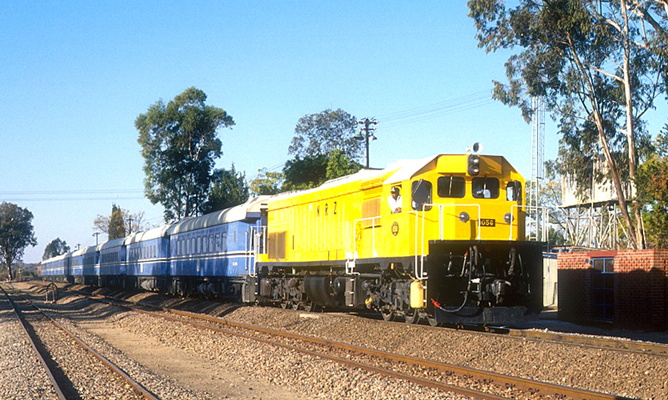
National Railways of Zimbabwe (NRZ) requires about $2 billion to be fully revitalised and transformed spokesperson for the parastatal, Fanuel Masikati has said.
BY MTHANDAZO NYONI
In the medium term, he said the organisation needed $500 million to restore its infrastructure to acceptable levels.
He said NRZ was currently implementing a number of strategies to enhance capacity in the short term using a combination of its own resources and funds received from government through the Public Sector Investment Programme.
“So far, NRZ has restored communication systems for trains to communicate with control centres on the Bulawayo-Victoria Falls, Bulawayo-Harare and Gweru-Chicualacuala corridors,”Masikati said.
“Some of the infrastructure was installed through partnerships with other service providers in the communication industry where the infrastructure would be shared.”

The company installed a GPS satellite tracking system on mainline locomotives to keep track and manage trains, in the absence of a signalling system.
- Chamisa under fire over US$120K donation
- Mavhunga puts DeMbare into Chibuku quarterfinals
- Pension funds bet on Cabora Bassa oilfields
- Councils defy govt fire tender directive
Keep Reading
It has also reduced the length of track infrastructure under speed restrictions to 284km from 422km and engaged some customers to finance the repair of wagons in return for a dedicated service.
“This mode of funding will be complemented by proceeds from disposal of scrap steel, which will be used to finance the refurbishment of wagons and locomotives,” Masikati said.
NRZ’s collapse has been blamed on government’s interference and the general decline of the economy.
Masikati said NRZ moved three million tonnes of goods last year, down from 3,8 million in 2014 as the rail parastatal’s fortunes continue to dip.
NRZ has failed to continue plying its three routes — Bulawayo- Harare, Mutare-Harare and Bulawayo-Chiredzi — on a daily basis. However, the Bulawayo-Victoria Falls passenger trains as well as freight trains are still operating daily.
The 3,8 million tonnes that NRZ moved in 2014 was lower than the projected 5,3 million tonnes.
Masikati attributed the decline in volumes to the prevailing economic challenges in the country where many companies have shut down or scaled down on production.
Masikati said at the beginning of 2015, there was optimism that the energy and mining sectors — which accounted for 50% of the budget — would perform well and provide the impetus for sustaining growth from the 2014 performance.
“However, the downturn in the business environment, particularly starting from the second quarter, saw the prospects of exporting in excess of half a million tonnes of coal and iron ore fading away, as international commodity prices continued to tumble,” Masikati said.
He said some of the organisation’s top customers operated at below 50% capacity, having been forced to scale down operations by the poor international commodity prices, power challenges, antiquated equipment, frequent plant breakdowns and lack of working capital due to the tight liquidity conditions.
“Accordingly, due to the depressed macro-economic environment and the resultant poor performance of the economy, business availed to NRZ by industry for bulk movement was low and insufficient to meet the projected tonnages.”
“Currently the traffic tonnage being moved by rail is very low due to the decline in business being availed to NRZ as a result of the prevailing economic challenges in the country where some companies have shut down or scaled down production.
“The low business from industry is also shared between NRZ and road transporters,” he said.
Masikati said NRZ had a total of 3 516 wagons available for moving cargo, out of a fleet size of 7 354 wagons.
He said the parastatal was facing challenges such as ageing infrastructure and equipment, which had surpassed its designed lifespan. The locomotives and wagons also needed replacement, he said.
Masikati said government’s efforts to secure off-shore funding and growth strategies for the economy would benefit “organisations like NRZ that mainly depend on derived demand”.











